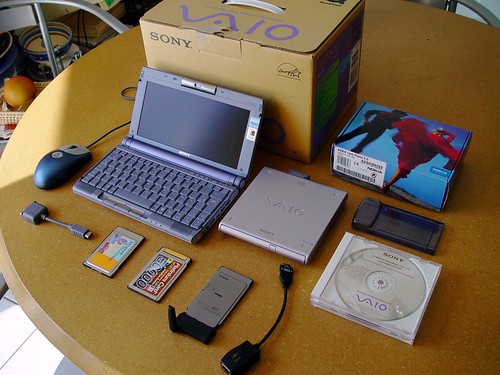‘The Golden Age of Silicon Valley Is Over, and We’re Dancing on its Grave’ – Derek Thompson – Business – The Atlantic – the golden age of Silicon Valley is considered over because it is now chasing the easy money. In reality this decline from the golden age is an evolution rather than a radical change. The golden age started its end when anufacturing left the valley decades ago. A sign of the golden age being over is that no one owns a silicon fab anymore. The reality is that the knowledge of design is wrapped up in the knowledge of making. A bigger end of the golden age sign is that even coding is outsourced to India. The migration from the golden age, to funding cheap low-hanging innovation over hard innovation is long-term. But the decline of the golden age isn’t anything you can blame Zuckerberg for, he’s merely a beneficiary
Business
Panasonic loss balloons 10-fold ‹ Japan Today: Japan News and Discussion – betting on convergence (doing it badly) and forgetting about quality. They made the mistake of thinking that people buy their brand for being the company logo rather than a complex sum of ‘Made in Japan’ quality, product design that delighted and high performance. They also tried to go for blockbusters rather than niches
Sony sees return to profit, aims to halve TV losses| Reuters – but sees (hopes for?) rebound to profit as Hirai restructures
Zuckerberg’s Hoodie a ‘Mark of Immaturity,’ Analyst Says – Bloomberg
China
As venture capitalists turn their backs on China, funding dries up | VentureBeat
Consumer behaviour
Next generation brands – FT.com – brand preference shifting amongst groups
Poll: Half of Americans Call Facebook a Passing Fad | TIME.com
Keep Gen-Xers Engaged | TIME.com
Culture
Fantazia – An inside view: Creamfields sold again – James Barton takes over LiveNation’s dance offerings and the private equity investors get an exit
The U.S. Government Interviews Isaac Asimov in 1975 | Motherboard
Design
Goodbye, hardwired switches and circuits: we’ll miss you (maybe) – “But there’s a downside to the indisputable efficiency of the soft key and touch screen approaches: it’s a much longer path, functionally, from initiation to final action. Perhaps we feel more removed from the consequences of our actions and how they are implemented; that’s a psychological aspect which is hard to assess.” – interesting that EET is talking the man machine interface so seriously on this
Economics
Varying Rates of Growth in the G-20 – Graphic – NYTimes.com
economics
Nick Hanauer TED Presentation About Why Rich People Aren’t Job Creators – Business Insider
Chart of the week: which way next for China’s trade surplus? | FT.com
Ethics
The Facebook-Free Baby – WSJ.com – Should parents just not share any baby photos on Facebook at all?
Finance
Is Insider Trading Part of the Fabric on Wall Street? – NYTimes.com – not terribly surprising when as an industry banks invest millions to get an edge on speed of trades for a small commercial lever
SecondMarket banks on rising tech stars, new markets | Bootstrap – CNET News
Citi: HSBC No Longer World’s Local Bank – Deal Journal – WSJ
Financial Crisis “Speeding Up” Yuan Liberalization – WSJ
How to
11 Tips for a Winning Gamification Strategy | Marketing Technology Blog
Fluid UI – iPhone & Android Mobile Mockups
Ideas
Missives for Developers & Founders – Freemium is a Money Burning Business Model, Cheapium is Better
Is the 1,9,90 Rule Outdated? – Only Dead Fish – models aren’t accurate predictors but ways that we get our heads around concepts, we take them too seriously. Despite this premise some interesting data here consumer behaviour
Health and Wellness: Games Can Motivate Players To Achieve Personal Goals | Latitude Research°
The Dishonored Sex: German Writer Pleads For Male Emancipation – Worldcrunch – Men’s greatest mistake was not claiming a place of their own. Three words sum up the male life story: career, competition, collapse.” This may sound subjective, perhaps a tad sniveling, but statistics back up what the author writes. On average, men in Germany die six years earlier than women. Interestingly, the author points out that where the lifestyle of both sexes is equivalent — among monks and nuns, for example, or those living in Israeli kibbutzim – there is no such difference in life expectancy. Interesting perspective.
It’s Time to Rethink Continuous Improvement – Harvard Business Review – interesting more nuanced viewpoint
Innovation
Researchers tout efficiency breakthrough with new ‘inexact’ chip — Engadget
Samsung pushes graphene one step closer to silicon supremacy — Engadget
Rough Type: Nicholas Carr’s Blog: The hierarchy of innovation
Ex-Microsoftie Robbie Bach: I wouldn’t have made Zune MP3 players, we were just ‘chasing Apple’ — Engadget – makes you wonder about the innovation message you keep seeing in the media about Microsoft
Canon Eyes Robot-only Production for Cameras | TIME.com
DARPA’s TransTac, BOLT, and other machine translation programs search for meaning. – Slate Magazine
Russia’s RVC: maritime navigation and other high-tech investments | FT.com – state VC operation starts to see returns after five years of investments
Why China? – interesting op ed on Chinese innovation
Ireland
Central Bank boss says US is partially to blame for Ireland’s economic crisis | Irish News | IrishCentral – “without the complacent expansion of credit by the globally integrated financial market countries like the United States, then Ireland and Britain wouldn’t be in the trouble that they find themselves today”
Luxury
Paul Smith plans fresh move into China – FT.com – experience in East Asia should be pretty useful
The Affluent Male Shops And Spends Online – US men
Louis Vuitton asks for SOPA-like seizure of hundreds of websites — GigaOm – smart lawyering or is the law being broken by enforcement agencies?
Jing Daily: The Business of Luxury and Culture in China – report: China To Lead Luxury Demand “For Years To Come”
Marketing
How To Get a Girl’s Number? China’s Touchmedia Has it Figured Out – Scene Asia – WSJ – interesting that Chinese marketers more interested in mobile numbers than email or home addresses. The mobile number has greater longevity
Media
German privacy official warns potential Facebook investors – latimes.com
I, Cringely » Blog Archive Why Facebook isn’t embarrassed by its IPO – Bob Cringely on Facebook’s optimally priced IPO
IP-Address Can’t Even Identify a State, BitTorrent Judge Rules | TorrentFreak
GM Says Facebook Ads Don’t Pay Off – WSJ.com – (paywall) not terribly surprising. Its hard to model attribution for car sales and the context isn’t great
Facebook isn’t working for marketers, says Forrester | The Wall Blog
People Click on About One of Every 2000 Facebook Ads They See – The Atlantic – you could argue that this is about brand awareness but that means Facebook is getting screwed by selling ads on CPC and the reality is that Facebook ads are poor at brand building
The world’s hottest digital markets: a music map — paidContent
Does Facebook Have a Trust Problem? – The Atlantic – you betcha
Facebook to Brands: You’re Posting Stuff Wrong | Digital – Advertising Age – conversational stuff doesn’t convert and Facebook isn’t a brand building platform
Finnish court rules open WiFi network owner not liable for infringement | Ars Technica
What’s a Movie Cloud? That’s up to you – I, Cringely – interesting attack on the movie industry oligopoly
German Online Newspapers Attract High Income Audience
Foursquare looks to merge check-ins with coupons | Econsultancy
Julu Mobile Aims to Transform the Mobile Ads Experience | Tech in Asia
Getting Sensitive: Sina Weibo Proposes New Content Rules – WSJ
Online
Google Gets Back to Its Roots With New Search Update – The Atlantic
[Rakuten, Inc.] Rakuten Leads Investment In Pinterest – press release
How Yahoo Killed Flickr and Lost the Internet – its not dead but its not growing and its attached to a rotting corpse, a bit like Yahoo! Finance and Sports. Everything else outside Asia should be lit up and burnt
Flickr Bickr – broadstuff – interesting take on Gizmodo’s flickr article
YouTube’s Video Views Are Falling – Advertising Age
UK Email Usage Shifting from Computer to Mobile – interesting data from comScore
With New Look, Bing Gets More Organized, Social – Technology Review
Between – An intimate space for two – a social network for two
Here’s Why Google and Facebook Might Completely Disappear in the Next 5 Years – Forbes – they won’t “completely disappear” though
Evernote Launches in China With Separate Service, Yinxiang Biji | Tech in Asia
Search engines have same speech rights as the New York Times, says Google report — paidContent
Retailing
CHART OF THE DAY: eBay Vs Etsy – Business Insider
Security
How To Keep Those Marketers From Spying On Your Phone – BYTE
NTT DOCOMO Unveils 19 New Mobile Devices— Wide range of models with enhanced support for extra-secure operation — NTT DOCOMO Global – really interesting focus on security
Software
Daring Fireball Linked List: Microsoft Antitrust Finding Specific to Windows on Intel? – is ARM a licence for Microsoft to be evil?
Technology
The Apple-Intel-Samsung Ménage à Trois | Monday Note
New Baidu Cloud phone unveiled: Changhong H5018 with 300GB of cloud storage – Engadget – the phone is the PC for many Chinese hence the large amount of storage
Telecoms
Fundamental Progress Solving Bufferbloat « jg’s Ramblings
TelecomTV | What’s happening to Telefónica? – interesting converged services developments likely to squeeze Microsoft and Nokia
Web of no web
How can you tell if you’re chatting with a bot?
Wireless
Worries mount as Nokia burns through cash | Reuters – bit of a non-story. If Nokia doesn’t turn things around in the next 24 months, it’s game over anyway whether they still have cash in the bank or not. Microsoft can’t wait that long
NTT DOCOMO to Launch Public Tender Offer for Buongiorno | NTT DOCOMO Global – interesting expansion move by NTT
Smartphones top computers for U.S. Facebook time | Reuters – mobile users spend 50 minutes more a month on Facebook than computer users





